March 13th – April 15th is Deaf History Month, and these books highlight what life is like for those with deafness. From well known historical figures to modern, every day people, these stories of perseverance and hope are sure to inspire!
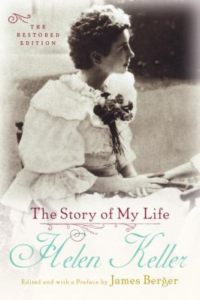 The Story of My Life by Helen Keller
The Story of My Life by Helen Keller
When she was 19 months old, Helen Keller (1880–1968) suffered a severe illness that left her blind and deaf. Not long after, she also became mute. Her tenacious struggle to overcome these handicaps-with the help of her inspired teacher, Anne Sullivan-is one of the great stories of human courage and dedication. In this classic autobiography, first published in 1903, Miss Keller recounts the first 22 years of her life, including the magical moment at the water pump when, recognizing the connection between the word “water” and the cold liquid flowing over her hand, she realized that objects had names. Subsequent experiences were equally noteworthy: her joy at eventually learning to speak, her friendships with Oliver Wendell Holmes, Edward Everett Hale and other notables, her education at Radcliffe (from which she graduated cum laude), and-underlying all-her extraordinary relationship with Miss Sullivan, who showed a remarkable genius for communicating with her eager and quick-to-learn pupil. These and many other aspects of Helen Keller’s life are presented here in clear, straightforward prose full of wonderful descriptions and imagery that would do credit to a sighted writer. Completely devoid of self-pity, yet full of love and compassion for others, this deeply moving memoir offers an unforgettable portrait of one of the outstanding women of the twentieth century.
Available Formats: Book, eBook (Hoopla), eAudiobook (Hoopla)
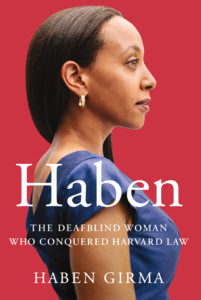 Haben: the Deafblind Woman Who Conquered Harvard Law by Haben Girma
Haben: the Deafblind Woman Who Conquered Harvard Law by Haben Girma
The incredible life story of Haben Girma, the first Deafblind graduate of Harvard Law School, and her amazing journey from isolation to the world stage. Haben grew up spending summers with her family in the enchanting Eritrean city of Asmara. There, she discovered courage as she faced off against a bull she couldn’t see, and found in herself an abiding strength as she absorbed her parents’ harrowing experiences during Eritrea’s thirty-year war with Ethiopia. Their refugee story inspired her to embark on a quest for knowledge, traveling the world in search of the secret to belonging. She explored numerous fascinating places, including Mali, where she helped build a school under the scorching Saharan sun. Her many adventures over the years range from the hair-raising to the hilarious. Haben defines disability as an opportunity for innovation. She learned non-visual techniques for everything from dancing salsa to handling an electric saw. She developed a text-to-braille communication system that created an exciting new way to connect with people. Haben pioneered her way through obstacles, graduated from Harvard Law, and now uses her talents to advocate for people with disabilities. Haben takes readers through a thrilling game of blind hide-and-seek in Louisiana, a treacherous climb up an iceberg in Alaska, and a magical moment with President Obama at The White House. Warm, funny, thoughtful, and uplifting, this captivating memoir is a testament to one woman’s determination to find the keys to connection.
Available Formats: Book
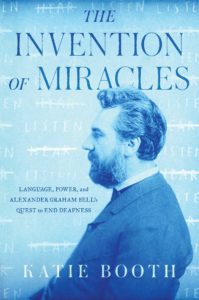 The Invention of Miracles: Language, Power, and Alexander Graham Bell’s Quest to End Deafness by Katie Booth
The Invention of Miracles: Language, Power, and Alexander Graham Bell’s Quest to End Deafness by Katie Booth
We think of Alexander Graham Bell as the inventor of the telephone, but that’s not how he saw his own career. As the son of a deaf woman and, later, husband to another, his goal in life from adolescence was to teach deaf students to speak. Even his tinkering sprang from his teaching work; the telephone had its origins as a speech reading machine. The Invention of Miracles takes a “stirring”, “provocative”, [and] “scrupulously researched” new look at an American icon, revealing the astonishing true genesis of the telephone and its connection to another, far more disturbing legacy of Bell’s: his efforts to suppress American Sign Language. Weaving together a dazzling tale of innovation with a moving love story, the book offers a heartbreaking account of how a champion can become an adversary and an enthralling depiction of the deaf community’s fight to reclaim a once-forbidden language. Katie Booth has been researching this story for more than fifteen years, poring over Bell’s papers, Library of Congress archives, and the records of deaf schools around America. But she’s also lived with this story for her entire life. Witnessing the damaging impact of Bell’s legacy on her family would set her on a path that overturned everything she thought she knew about language, power, deafness, and the telephone.
Available Formats: Book
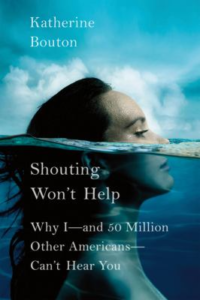 Shouting Won’t Help: Why I -and 50 Million Other Americans- Can’t Hear You by Katherine Bouton
Shouting Won’t Help: Why I -and 50 Million Other Americans- Can’t Hear You by Katherine Bouton
For twenty-two years, Katherine Bouton had a secret that grew harder to keep every day. An editor at The New York Times , at daily editorial meetings she couldn’t hear what her colleagues were saying. She had gone profoundly deaf in her left ear; her right was getting worse. As she once put it, she was “the kind of person who might have used an ear trumpet in the nineteenth century.” Shouting Won’t Help is a deftly written, deeply felt look at a widespread and misunderstood phenomenon. In the style of Jerome Groopman and Atul Gawande, and using her experience as a guide, Bouton examines the problem personally, psychologically, and physiologically. She speaks with doctors, audiologists, and neurobiologists, and with a variety of people afflicted with midlife hearing loss, braiding their stories with her own to illuminate the startling effects of the condition.
The result is a surprisingly engaging account of what it’s like to live with an invisible disability–and a robust prescription for our nation’s increasing problem with deafness.
Available Formats: Book
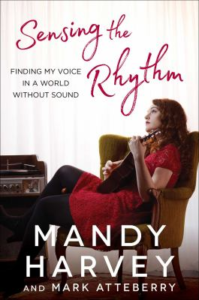 Sensing the Rhythm: Finding My Voice in a World Without Sound by Mandy Harvey
Sensing the Rhythm: Finding My Voice in a World Without Sound by Mandy Harvey
The inspiring true story of Mandy Harvey -a young woman who became deaf at age nineteen while pursuing a degree in music- and how she overcame adversity and found the courage to live out her dreams. When Mandy Harvey began her freshman year at Colorado State University, she could see her future coming together right before her eyes. A gifted musician with perfect pitch, she planned to get a music degree and pursue a career doing what she loved. But less than two months into her first semester, she noticed she was having trouble hearing her professors. In a matter of months, Mandy was profoundly deaf. With her dreams so completely crushed, Mandy dropped out of college and suffered a year of severe depression. But one day, things changed. Mandy’s father asked her to join him in their once favorite pastime–recording music together–and the result was stunningly beautiful. Mandy soon learned to sense the vibrations of the music through her bare feet on a stage floor and to watch visual cues from her live accompaniment. The result was that she now sings on key, on beat, and in time, performing jazz, ballads, and sultry blues around the country. Full of inspiring wisdom and honest advice, Sensing the Rhythm is a deeply moving story about Mandy’s journey through profound loss, how she found hope and meaning in the face of adversity, and how she discovered a new sense of passion and joy.
Available Formats: Book, eAudiobook (Hoopla)
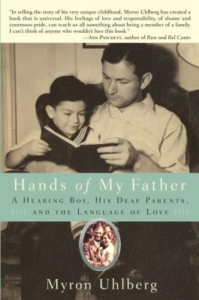 Hands of My Father: a Hearing Boy, His Deaf Parents, and the Language of Love by Myron Uhlberg
Hands of My Father: a Hearing Boy, His Deaf Parents, and the Language of Love by Myron Uhlberg
By turns heart-tugging and hilarious, Myron Uhlberg’s memoir tells the story of growing up as the hearing son of deaf parents–and his life in a world that he found unaccountably beautiful, even as he longed to escape it. “Does sound have rhythm?” my father asked. “Does it rise and fall like the ocean? Does it come and go like the wind?” Such were the kinds of questions that Myron Uhlberg’s deaf father asked him from earliest childhood, in his eternal quest to decipher, and to understand, the elusive nature of sound. Quite a challenge for a young boy, and one of many he would face. Uhlberg’s first language was American Sign Language, the first sign he learned: “I love you.” But his second language was spoken English–and no sooner did he learn it than he was called upon to act as his father’s ears and mouth in the stores and streets of the neighborhood beyond their silent apartment in Brooklyn. Resentful as he sometimes was of the heavy burdens heaped on his small shoulders, he nonetheless adored his parents, who passed on to him their own passionate engagement with life. These two remarkable people married and had children at the absolute bottom of the Great Depression–an expression of extraordinary optimism, and typical of the joy and resilience they were able to summon at even the darkest of times. From the beaches of Coney Island to Ebbets Field, where he watches his father’s hero Jackie Robinson play ball, from the branch library above the local Chinese restaurant where the odor of chow mein rose from the pages of the books he devoured to the hospital ward where he visits his polio-afflicted friend, this is a memoir filled with stories about growing up not just as the child of two deaf people but as a book-loving, mischief-making, tree-climbing kid during the remarkably eventful period that spanned the Depression, the War, and the early fifties.
Available Formats: eBook (OverDrive)
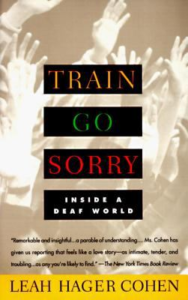 Train Go Sorry: Inside a Deaf World by Leah Hager Cohen
Train Go Sorry: Inside a Deaf World by Leah Hager Cohen
In American Sign Language, “train go sorry” means “missing the boat.” Leah Hager Cohen uses the phrase as shorthand for the myriad missed connections between the deaf and the hearing. Yet in this stunning work of journalism and memoir she also forges new connections. As she ushers readers into New York’s Lexington School for the Deaf, Cohen (whose grandfather was deaf and whose father was the school’s superintendent) conveys the intimate truths of this silent but articulate world.
Available Formats: eBook (Hoopla)
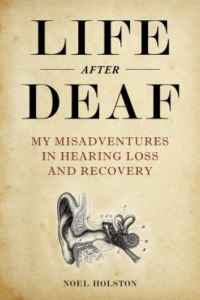 Life After Deaf: My Misadventures in Hearing Loss and Recovery by Noel Holston
Life After Deaf: My Misadventures in Hearing Loss and Recovery by Noel Holston
From a renowned media critic to a man with sudden and full hearing loss, Noel Holston ran the gauntlet of diagnoses, health insurance, and cochlear implant surgery. On a spring night in 2010, Noel Holston, a journalist, songwriter, and storyteller, went to bed with reasonably intact hearing. By dawn, it was gone, thus beginning a long process of hearing-restoration that included misdiagnoses, an obstinate health-insurance bureaucracy, failed cochlear-implant surgery, and a second surgery that finally worked. He negotiated the gauntlet with a wry sense of humor and the aid of his supportive wife, Marty. Life After Deaf details his experience with warmth, understanding, and candor. It’s the story not only of his way back to the world of the hearing, but of a great marriage that weathered serious testing. Their determination and resilience serve as a source of inspiration for all. Life After Deaf is not just for the more than forty million people in the United States alone who cope with some form of hearing loss, but is also for their wide circles of friends, family, caregivers, and audiologists.
Available Formats: eBook (Hoopla)
 The Silent Garden: a Parent’s Guide to Raising a Deaf Child by Paul W. Ogden
The Silent Garden: a Parent’s Guide to Raising a Deaf Child by Paul W. Ogden
For over 30 years, The Silent Garden has offered parents of deaf children the support and unbiased information needed to fully realize their children’s potential. This completely revised third edition is a must-have resource that will help parents navigate the complex and unique challenges they face. Accessible, practical, and, above all, open-minded, The Silent Garden educates parents quickly and thoroughly about the many conflicting points of view on what is best for their deaf children. Authors Paul W. Ogden and David H. Smith, who are both deaf, present examples and research that guide parents through often unfamiliar territory. From coping mechanisms for parents to advice on creating healthy home environments, the authors cover a range of topics that impact day-to-day actions and decision-making. The topic of communication is discussed extensively as communication access and language development are crucial not only for intellectual growth, but also for positive family and social relationships.
Available Formats: Book, eBook (OverDrive)
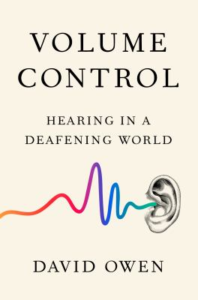 Volume Control: Hearing in a Deafening World by David Owen
Volume Control: Hearing in a Deafening World by David Owen
Millions of Americans suffer from hearing loss. Faced with the cost and stigma of hearing aids, the natural human tendency is to do nothing and hope for the best, usually while pretending that nothing is wrong. In Volume Control, David Owen argues this inaction comes with a huge social cost. He demystifies the science of hearing while encouraging readers to get the treatment they need for hearing loss and protect the hearing they still have. With wit and clarity, Owen explores the incredible possibilities of technologically assisted hearing. And he proves that ears, whether they’re working or not, are endlessly interesting.
Available Formats: Book
We love helping people find books, movies, and more.
Tell us about your preferences, and our librarians will create a list of titles selected specifically for you.